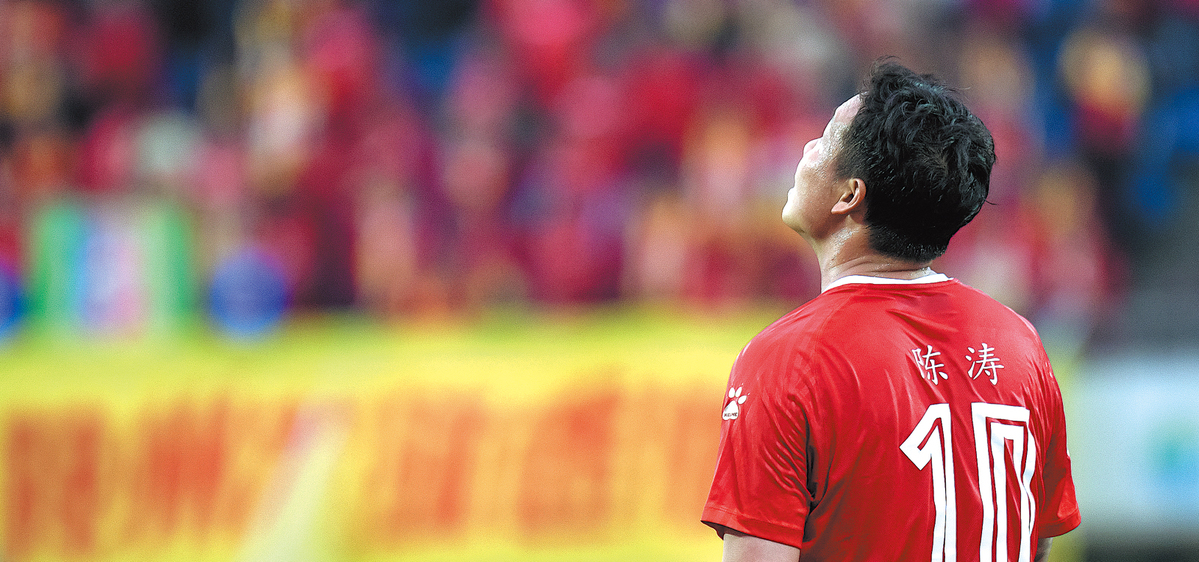China's crumbling clubs exposed by weak foundations
 0 Comment(s)
0 Comment(s) Print
Print E-mail China Daily, May 27, 2020
E-mail China Daily, May 27, 2020

These days it's hard to imagine that a Chinese club could one day boast a century-long history like European giants such as Barcelona or Liverpool.
Sure, that may be an unfair comparison to make, given that the professionalization of Chinese soccer only began in the early 1990s. However, the current financial clouds hanging over the domestic game certainly do not inspire confidence.
Operating without sustainable business models and with an over-reliance on investment, many clubs' early success ultimately proves to be a flash in the pan. Worse still, some sink without a trace to leave behind not much more than memories and regrets.
The extent of Chinese soccer's monetary misery, which has been exacerbated by the sport's shutdown due to the COVID-19 pandemic, was laid bare on Saturday when the Chinese Football Association announced that 16 clubs across the top three divisions will not compete in the pro ranks next season due to financial problems.
According to the CFA, 11 clubs have been have been thrown out of the leagues for next season due to wage arrears. They are: Guangdong Southern Tigers, Sichuan Longfor, Liaoning Hongyun, Shanghai Shenxin, Yinchuan Helanshan, Dalian Chanjoy, Fujian Tianxin, Yanbian Beiguo, Jilin Baijia, Nanjing Shaye and Baoding Rongda.
Another five clubs have voluntarily quit the leagues due to money troubles. They are Shenzhen Pengcheng, Hangzhou Wuyue Qiantang, Heze Caozhou, Nanjing Balanta and top-tier Tianjin Tianhai.
The fall of the storied Liaoning Hongyun has been particularly sad to see.
The 67-year-old club won the Jia-A league, which was the predecessor to the Chinese Super League, six times from 1987 to 1993.
Despite being surpassed by new giants of the game such as Guangzhou Evergrande and Shanghai SIPG, Liaoning still holds a special place in fans' hearts.
The club briefly revived its glory days in 2011 when it managed a third-place finish in the CSL.
However, relegation to the second-tier China League One in 2017 signaled the start of a downward spiral for the club that has ultimately resulted in an end, at least temporarily, to its days in the pro ranks.
"All our efforts have to end, and we announce that we are quitting the Chinese professional leagues," read a Liaoning statement on Sunday.
"Despite having to leave, the spirit of our club will endure. We believe there will be newcomers to inherit our tradition and restore the glory."
The demise of Tianjin Tianhai earlier this month was another depressing episode for the domestic game.
Tianhai had once appeared to be on the cusp of becoming a permanent fixture among the CSL's elite when in 2017 it qualified for the AFC Champions League, with Italy's World Cup-winning captain Fabio Cannavaro as head coach and world-class players such as Axel Witsel and Alexandre Pato on its payroll.
However, both Tianhai and Liaoning's weak financial foundations have been exposed during soccer's shutdown and both their houses have come tumbling down as a result.
Investors often run scared when poor results on the pitch or unforeseen crises such as the coronavirus outbreak suddenly stall the good times. Without sufficient funds, daily operations become an issue, let alone importing big-name players or investing in youth training.
Performances continue to dive and investment declines further as a vicious circle is set in motion that can eventually prove fatal for a club.
The postponement of the Chinese professional leagues' 2020 season as a result of the COVID-19 epidemic has starved clubs of ticket revenues and merchandise sales, while teams still have to pay for players, coaches and their operating costs.
The more financially robust clubs have been endeavoring to ride out the current shutdown and continue to train as they await the green light on next season's kickoff, which had originally been scheduled to start on Feb 22.
"Liaoning and Tianhai are iconic Chinese teams with many highlights in their history… Despite battling so hard to survive, the clubs still couldn't escape from the shackles of debt," read a commentary from thepaper.cn.
"They were devoured by the wave of inflated investment of Chinese soccer. And they eventually became the unlucky ones who were flushed out of the game."
From a less-sentimental perspective, some observers argue that, by waving goodbye to these 16 teams, the CFA is relieving the game of a heavy burden that it frankly does not need, and is sending a timely warning to others to keep a tighter grip on their finances.
Down the line, continuing to try and keep the Chinese game afloat with such teams on board could ultimately prove catastrophic for more than just the debt-ridden clubs.
"We sincerely hope that clubs of all levels will focus on their long-term development and rational management methods, in order to ensure the rights of players, coaches and staff at clubs," read Saturday's CFA statement.
"So we can gradually achieve the sustainable development of Chinese professional soccer."






Go to Forum >>0 Comment(s)